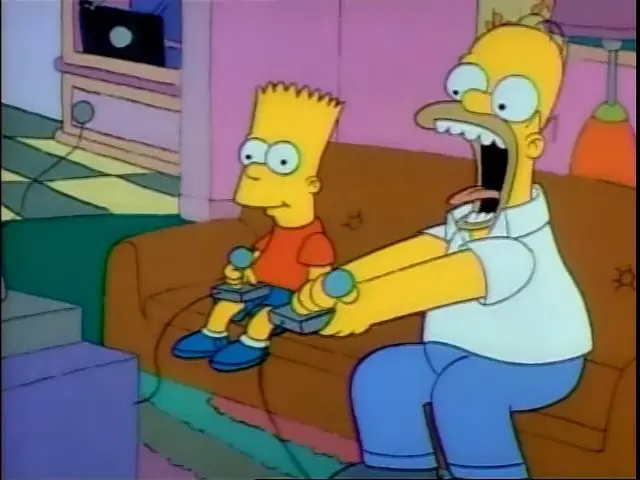My Recollection
Bleeding Gums Murphy and Video Boxing.
The Episode
There’s a Creepypasta around somewhere that claims this was a replacement for an episode titled Dead Bart which is a solid misfire from the pasta’s writer as their episode idea, about Bart actually dying, is only marginally darker than one about childhood depression. I’m a firm believer in laughing at even the most horrific of things, you can’t control the universe but you can control how you react to it, but the earlier season’s focus on situation over comedy means the necessary counterweight is always a little lacking. The result is a story with some great character moments but also some frustrating wading into the nature of depression. But! What’s this? Within this arc layeth a second, some refer to as B, story about Homer and Bart playing fighting games. This is the first episode of The Simpsons to have a B story and it provides a few chuckles on it’s own as well as some great ones in the context of the modern era.
Nothing screams “LISA EPISODE” quite like an opening close up on Lisa’s miserable face. Sitcoms tend to have this kind of balancing issue, where they’ll separate the goofy and serious into entirely different characters, either over time or through bad character design. It’s a bad way of doing things because the compartmentalisation leads to predictability and is the origin point for flanderisation. This is why we get B stories. Lisa is the serious character and her serious story can’t be mixed with humour so the work is offset to the goofy characters. Repeat this for a few years and you get characters with no depth and an audience wary of episodes that focus on the “serious” ones. Some of this is an artifact of older comedy writing. There’s a lot of modern series —Bojack, and Rick and Morty for instance– that deftly blend the serious and funny but that sort of business was alienating to 90s audiences so very few tried and even fewer succeeded. So here we have a Lisa episode with the goofy and the miserable separated like couples at a middle school dance.

Lisa is sad. She’s just sad and that’s it. It’s intensely frustrating to watch as I find the narcissism of depression embarrassing and grotesque. Lisa’s an emotional burden on her family but it’s everyone else who is selfish or insensitive. This is actually a nifty example of some of the worst of the depressive thought process. Lisa gives up a cupcake, openly stating to the family that she doesn’t want it and it wouldn’t make her happy, only to later use it as a source of her pain and troubles. Fuck you. Fuck you, you fucking selfish dunce. Yeah, why would the family think the words you said meant a thing when clearly they are supposed to immediately understand your real pain and fix it in a manner even you could never actually articulate because even you don’t know what it is.
These days people cover for this with a Facebook post about loving their supportive friends before not making any personal changes and repeating the cycle. This show was 13 years prior to Facebook, though, so, lacking the ability to Vaguebook her way into parasitising validation from others, it’s the rest of the family that has to deal with this. Trying to explain depression to the normals is like trying to convince a deck chair that it doesn’t exist, and with this in mind Lisa still does a fairly terrible job of it. But where Lisa fails, the episode succeeds by taking us through a day full of reasons for Lisa to be sad but having none of them be it. This is the core difference between externally driven negative emotions and long term state independent negativity. You don’t have depression if your mum died; you have depression when it’s there with no cause at all.
Meanwhile, Bart is beating Homer at Slugfest and what was a cute little B story back in 1990 gains a bit more humour here in the magical, far-off future. First of all, they refer to it as “video boxing” which is as delightfully antiquated as the Atari 2600 controls they are using to play it. I’m not sure when it first started to change, finding out can be your homework, but for most of television we never saw an accurate depiction of people playing videogames. It’s probably a side-effect of wanting the shot to look interesting, but there’s always a level of physical movement we wouldn’t see until the 2006 release of the Wii. There was at least 20 years of people playing every videogame by mashing all buttons at once and attempting basic semaphore with the controller. Bart constantly thrashes Homer, and it’s getting to him enough that he decides to get good.
Whoa, steady on the fun there, Champ, Lisa is sad. Cue the introduction of one of The Simpsons’ better side characters, a man given depth but not overused, Bleeding Gums Murphy. Voiced by the late Ron Taylor, Murphy is Lisa’s Magical Blues Negro, but really, what’s he gonna be, white? He’s blessed by having a depth of character through expression rather than a series of retcon narrative turns that has been the doom of a lot of other Simpsons’ lower tier characters. He’s in fine form here, and probably gets line of the episode with his remark that, “The blues isn’t about making yourself feeling better, it’s about making other people feel worse.”
The other character getting some actual development here is Marge. Homer and Bart are busy with the fighting game community so she’s left to be the functional parent with Lisa. Her advice, to just smile through it until the lie becomes truth, is wonderfully backed with a flashback that gives you a window into Marge’s doormat nature. This is built upon in future episodes, Marge being a victim of a world that has, at every turn, told her to stop thinking or trying. Marge’s arc is tied to Lisa’s but it is nearly a C story by itself. It culminates in her seeing the damage the advice her mother gave her is doing to Lisa, and watching her daughter stifle who she is to please jerks and idiots is enough to make her snap. Marge is locked in a life she can’t change, the willpower that would be her way out is spent controlling her own anger at the situation. And so she remains trapped. Her mother’s advice is what’s driving her mad and keeping her sane all at once. Her outburst at Lisa, telling her to feel however she wants, is as cathartic to her daughter as it is her. Lisa is very smart, she can probably see the world her mother is locked in and even knows she is one of the bars in the prison. Seeing her mother express a bit of freedom is enough to show Lisa that things can change, and she smiles once more.
Counter to the horror of a smart child seeing the how they helped crush a parent they loved is Bart’s gleeful destruction of his insecure, but aware of his own inability, father. Homer knows enough to see that there is a way out but that he doesn’t, and won’t ever, have the means of escaping. But why bother with a nightmarish inner problem when you can go to the arcade and lab Slugfest until you can beat down your disobedient son. That Slugfest is the same in the arcade as it is at home means that they’ve got an arcade perfect port in 1990, which is goddamn bullshit. Aside from that grievous error, this episode is a window into what the 90s thought about videogames.

Both Homer and the arcade wizard Howard are mocked for wasting their time playing videogames because nobody will ever pay you to do that so you’d better get back to learning something practical like auto part machining or something. You brats and your spoiled modern bullshit. This was a joke not because of some prejudice, but because it was actually absurd. Now we live in the magical future where useless fuckwits can somehow earn money for doing absolutely nothing of value.
Homer belts the everloving shit out of Bart, but has his win taken from him by a wife who couldn’t wait 5 seconds or even pretend that the tiny things her husband uses to maintain his sense of worth are important. The family finish the episode by watching Bleeding Gums perform the song Lisa improvised on the bridge.
This is like a lot of season 1 episodes in that it’s not particularly funny, but unlike a lot of season 1 episodes it makes up for that with some meaningful and vital character development. No individual character in the family can be whole without the others having equal depth. A weak link in that chain will break every attempt at meaningful connection or plot, and this is been an issue particularly with Marge for the last few episodes. While the episode is about Lisa, her age makes certain gaps inevitable and expected by the audience because she is still growing into herself. This is a dysfunctional family and that only makes sense when we see how everyone is dysfunctional. Marge’s flashback and her terrifying fake smile fill in the rest of the family misery. Just smile. Depth is irrelevant. Your pain is irrelevant. You cannot fix anything so just smile. Just smile.

And finally she stopped smiling.
Lisa’s depression here was at a time when mental illness in adults wasn’t an openly discussed thing, let alone anything manifesting in children. Being a sufferer myself makes a lot of this a bit frustrating to watch. There’s a real, cruel selfishness to depression that people tiptoe around for fear of adding to a sufferer’s weight. What Moaning Lisa illustrates well, though, is that there is only one weight and even in a world of real problems, it’s the only one that matters. Naming a thing is a double edged sword but you can’t fight something you don’t see so it’s a necessary one. Lisa struggles mostly because nobody knows what the problem is. Marge finally snapping and telling Lisa she can do what she wants works as a kind of cure because it understands that the problem is internal, which is an idea the rest of the episode shows everyone struggle with. It’s a feeling. You can feel bad. You can also feel good. Understanding the nature of the prison is the first step to escaping.
Jokes, lines and stray thoughts.
I was always a bit envious of how videogames looked in The Simpsons. This was the same year the SNES was released, so seeing something with all these beautiful, bespoke animations was something I wished games could do. Now they can do them and I play old games via emulator. My want is infinite and can never be satisfied. There is no escape.
Bleeding Gums is a side character who works largely because he’s such an archetype you don’t really need to do much and people will fill in the blanks themselves. There is ample room for thought on his depths, though, like that he’s playing on the same bridge Homer tried to kill himself on a few episodes back.
Yours in petitioning Capcom for a Slugfest 2, Gabriel.






3 replies to Moaning Lisa
Bungus Bronbo on 25th August 201725 Aug 17 said:
Goddamn I'm enjoying these reviews.
daft_john on 25th August 201725 Aug 17 said:
I really enjoyed this review and it was certainly thought provoking, especially how I was feeling today before reading this.
Thank you Gabriel for taking the time to do this.
"Now we live in the magical future where useless fuckwits can somehow earn money for doing absolutely nothing of value." - The enjoyment I receive from reading this article and my changed perspective on life is the value you bring. Although not sure the exact ratio of "Value" to $ but I'd say this was definitely worth my Patreon money!
Kendra on 25th July 201925 Jul 19 said:
The mentioned pasta: https://creepypasta.fandom.com/wiki/Dead_Bart
Comment on Moaning Lisa
To reply, please Log in